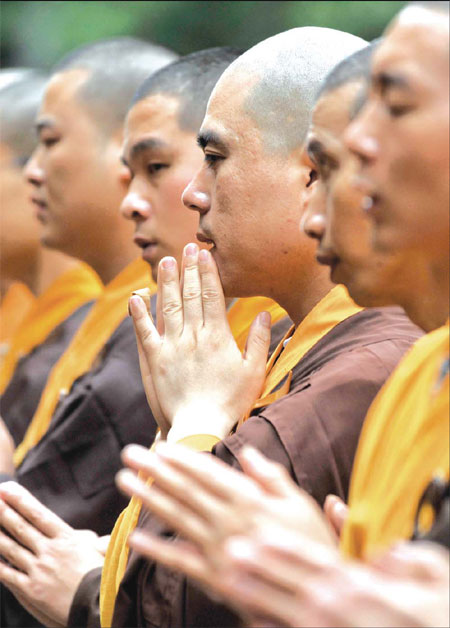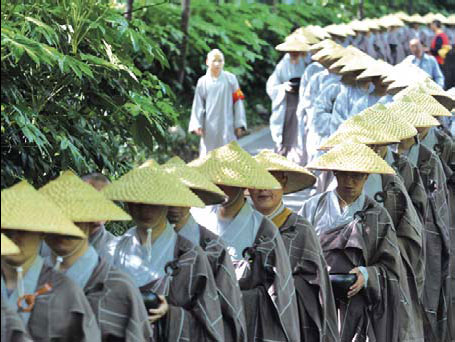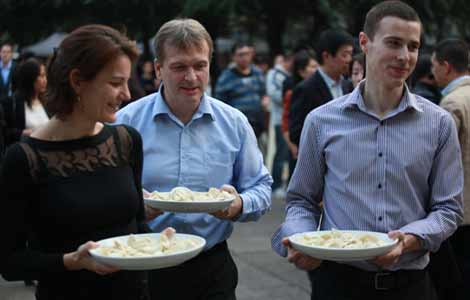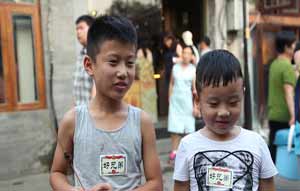Chance leads to a divine new path
Updated: 2013-10-08 07:32
By Han Bingbin (China Daily)
|
||||||||
Author Zhao Defa expands his boundaries with an exploration into the survival of Chinese Buddhism in modern-day society, Han Bingbin reports.
Suffering hardships while growing up in rural Shandong province in the 1950s and 60s, writer Zhao Defa rose to fame because of his self-inspired and thought-provoking countryside trilogy that forcefully delves into the intertwining relations of land, rural ethics and politics.
But as a professional writer, for a long time he embarrassedly found himself unable to find a new field of writing that's out of his experiences yet inspires equally profound thinking.
One day in 2003 he was approached by the abbot of a local temple to give a cultural talk. While the humble writer prepared himself by glancing over a few books on Buddhism, it soon occurred to him religion is exactly the topic that arouses both his curiosity and intellectual hunger.
|
Author Zhao Defa's latest book, Shuangshou Heshi (Praying Hands), sheds new light on monks' lives and the impact of modernization on Buddhism. Photos provided to China Daily |
|
Lingyin Temple, one of the country's largest Buddhist temples in Hangzhou, hosts a charity ritual drawing monks from home and abroad. |
He immediately pinned down his next book, a non-fictional exploration into the survival of Chinese Buddhism in modern-day society, to be wrapped up in a fictional storyline.
What followed his first attempt at non-fiction was a brand-new way of working. He had to first of all read dozens of Buddhism classics, while taking copious notes.
In the following four years, he lived in nearly all of China's major Buddhist temples.
While closely observing the lives of various monks, he bore his questions in mind: How do these monks fight against their own worldly desires? How has constant social transformation impacted Buddhism?
In his book Shuangshou Heshi (Praying Hands), readers will find their own answers to these questions by following the life of Huiyu, a fictional protagonist who went through many struggles against obstacles from both within himself and the outside world to finally be enlightened to create his own way of practicing Zen.
"How to face the suffering? How to use Buddhism doctrine to instruct life and purify the heart? That's what some responsible monks have been doing these days," the author says.
"In my book, there are also portraits of those who try to make a fortune using Buddhism, a sign of how social transformation has caused disturbance within religion. The meaning of life is being questioned in both the monks' and the laymen's world."
Literature critic He Shaojun says the book, even though with a new theme, has actually carried on Zhao's constant reflections on moral principles in social changes by exploring how Buddhist culture interacts with modern ethics.
Beijing Normal University's Chinese literature professor Zhang Qinghua says just like how Zhao acutely detected the disappearing of land and rural civilization during industrialization, the author has again demonstrated his admirable sensitivity to social and cultural changes.
Zhao says there's part of himself in Huiyu: brought up under Confucius principles, being through a lot of suffering but still unwilling to associate himself with undesirable social trends.
His childhood and teenage years were constantly haunted by poverty, hunger and disease. He says he now still remembers which tree leaves and grass tasted better as they used to be his staple food.
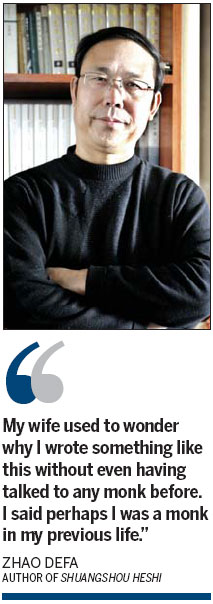
The decades of pain from skin allergy was unbearable, only relieved when the poor little music fan practiced fingering on a fake flute made of willow branch.
As the oldest son, he started to shoulder the family burden by working in the fields at age 14.
But unlike Huiyu, who as Zhao wrote, followed the Buddhism doctrines to let go of his desires and miseries, the way Zhao dealt with his own challenges was an aggressive one.
"I can't go back. I must run forward. I want to leave the countryside and get away from poverty," he recalls.
While working as a private school teacher at 15, he started preparing himself for a better future by reading extensively.
At 23, he embraced a key change in his life after passing an examination to become a State-sponsored public school teacher, shortly before he was promoted to be a local official.
Since then, he has enjoyed speedy promotion in his official career. By 30, he was already the deputy director at a county-level organization.
But he was brave enough to give up what he had, driven by what he calls his "ghostly obsession with writing".
Ranking No 2 at the entrance examination, he successfully enrolled in the writer's workshop at Shandong University, only to find his dream an impractical one as his contributions to various publications were all returned in the first year.
Once again he indulged himself in extensive reading and more importantly, his memories of countryside life where he found the theme for his first novelette, about the wives of northern communist officials who remarried after they were encouraged to go to the south in the late 1940s.
The story won him a national literature award and launched a successful writing career.
Given what he has achieved today, the interesting question people often throw at Zhao is this: If he had met Buddhism much earlier in his life when he still suffered enormously, would he have converted?
"It's hard to say. Even after learning so much about Buddhism, I'm not converted. I understand some of the teachings. But for some others I don't fully understand and accept. I studied it as a cultural phenomenon," he says.
"Huiyu is of course an ideal character. I am still very much a secular person in real life.
"My wife used to wonder why I wrote something like this without even having talked to any monk before. I said perhaps I was a monk in my previous life."
Contact the writer at hanbingbin@chinadaily.com.cn.
(China Daily 10/08/2013 page19)

 Victoria Beckham S/S 2014 presented during NYFW
Victoria Beckham S/S 2014 presented during NYFW
 'Despicable' minions upset Depp's 'Lone Ranger' at box office
'Despicable' minions upset Depp's 'Lone Ranger' at box office
 'Taken 2' grabs movie box office crown
'Taken 2' grabs movie box office crown
 Rihanna's 'Diamonds' tops UK pop chart
Rihanna's 'Diamonds' tops UK pop chart
 Fans get look at vintage Rolling Stones
Fans get look at vintage Rolling Stones
 Celebrities attend Power of Women event
Celebrities attend Power of Women event
 Ang Lee breaks 'every rule' to make unlikely new Life of Pi film
Ang Lee breaks 'every rule' to make unlikely new Life of Pi film
 Rihanna almost thrown out of nightclub
Rihanna almost thrown out of nightclub
Most Viewed
Editor's Picks

|

|

|

|

|

|
Today's Top News
Going green can make good money sense
Senate leader 'confident' fiscal crisis can be averted
China's Sept CPI rose 3.1%
No new findings over Arafat's death: official
Detained US citizen dies in Egypt
Investment week kicks off in Dallas
Chinese firm joins UK airport enterprise
Trending news across China
US Weekly

|

|
